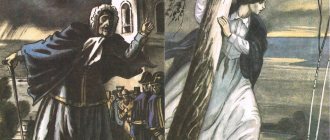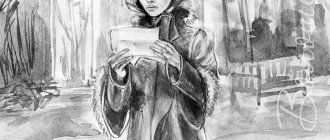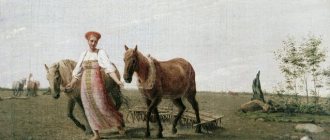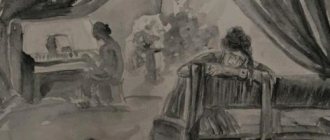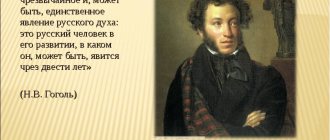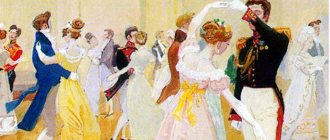Interesting Facts
After the writing of five Pushkin works with different names, the genre of realistic prose became popular. In short, the stories are distinguished by their transparency and simplicity of presentation; the severity and humility of the everyday life of different people are clearly visible in them. However, contemporaries did not accept the writer’s prosaic experience. Belinsky called the works quite tolerable and said that they were only suitable for reading out of boredom. He equated them to fairy tales, often read in the family circle, which were of a level suitable for an aspiring writer, and not for the talented Pushkin.
The stories were written in a short period of time. The writer gives their authorship to Belkin, but introduces himself as an ordinary publisher and remains anonymous. Why he did this is unknown. Already in the preface it becomes clear that Ivan Petrovich comes from the family of a second-major; he was raised by the village sexton. Belkin served in the Jaeger regiment. After retiring, he began managing the estate he inherited, but things were not going too well. This person:
- honest;
- bashful;
- not particularly outstanding;
- moderate towards excesses.
In adulthood, Belkin developed skills in writing, and his passion for literature made itself felt. At first glance, it may seem that the stories are written simply and naturally, but their storyline is built quite complex. The texts are narrated by several narrators, of which the following stand out:
- a fictional character in the person of Ivan Petrovich;
- an ironic writer and part-time publisher;
- characters who told Belkin life stories.
When studying the works in detail, the reader gets the impression that they are part of real life and were created by different authors. Pushkin used an unusual narrative system, which was completely able to break the usual literary approaches with romantic cliches.
By this, he sought to convey the unpredictability of life, the reality of which is much more interesting than fictional and fantasy techniques. The main link between the works is precisely this idea. Already at the time of publication, the order of the texts was changed in accordance with the date of their creation.
Stories of the late Ivan Petrovich Belkin
My dear sir ** **!
I had the honor to receive your most respected letter dated the 15th of this month on the 23rd of this month, in which you express to me your desire to have detailed information about the time of birth and death, about the service, about home circumstances, also about the activities and disposition of the late Ivan Petrovich Belkin, my former sincere friend and neighbor on the estates. With my great pleasure, I fulfill this desire of yours and forward to you, my dear sir, everything that I can remember from his conversations, as well as from my own observations.
Ivan Petrovich Belkin was born from honest and noble parents in 1798 in the village of Goryukhin. His late father, Second Major Pyotr Ivanovich Belkin, was married to the girl Pelageya Gavrilovna from the Trafilin family. He was not a rich man, but moderate, and very smart when it came to farming. Their son received his initial education from the village sexton. It seems that he was indebted to this respectable husband for his desire to read and study Russian literature. In 1815, he entered service in the Jaeger infantry regiment (I don’t remember the number), in which he remained until 1823. The death of his parents, which happened almost at the same time, forced him to resign and come to the village of Goryukhino, his homeland.
Having entered into the management of the estate, Ivan Petrovich, due to his inexperience and soft-heartedness, soon launched the farm and weakened the strict order established by his late parent. Having replaced the efficient and efficient headman, with whom his peasants (according to their habit) were dissatisfied, he entrusted the management of the village to his old housekeeper, who acquired his power of attorney through the art of telling stories. This stupid old woman never knew how to distinguish a twenty-five-ruble note from a fifty-ruble note; the peasants, to whom she was all godfather, were not at all afraid of her; The headman chosen by them indulged them so much, cheating at the same time, that Ivan Petrovich was forced to abolish the corvee and establish a very moderate rent; but even here the peasants, taking advantage of his weakness, begged for a deliberate benefit for the first year, and in the next year more than two-thirds of the rent was paid in nuts, lingonberries and the like; and there were arrears.
Having been a friend of Ivan Petrovich’s late parent, I considered it my duty to offer my son my advice and repeatedly volunteered to restore the previous order that he had lost. For this purpose, having come to him one day, I demanded the business books, called the rogue headman, and in the presence of Ivan Petrovich began to examine them. The young master first began to follow me with all possible attention and diligence; but as it turned out, according to the accounts, that in the last two years the number of peasants had increased, and the number of yard birds and livestock had deliberately decreased, Ivan Petrovich was content with this first information and did not listen to me further, and at that very moment, as I, with my investigations and strict By interrogating the rogue, I brought the headman into extreme confusion and forced him into complete silence; with my great annoyance I heard Ivan Petrovich snoring heavily in his chair. From then on, I stopped interfering with his economic orders and handed over his affairs (like himself) to the orders of the Almighty.
This, however, did not upset our friendly relations at all; for I, sympathizing with his weakness and the destructive negligence common to our young nobles, sincerely loved Ivan Petrovich; Yes, it was impossible not to love a young man so meek and honest. For his part, Ivan Petrovich showed respect for my years and was sincerely committed to me. Until his death, he saw me almost every day, valuing my simple conversation, although we for the most part did not resemble each other in habits, way of thinking, or disposition.
Ivan Petrovich led a very moderate life, avoiding all kinds of excesses; I never happened to see him drunk (which in our region can be considered an unheard-of miracle); He had a great inclination towards the female sex, but his modesty was truly girlish. *
In addition to the stories that you would like to mention in your letter, Ivan Petrovich left many manuscripts, some of which are in my possession, some of which were used by his housekeeper for various household needs. Thus, last winter, all the windows of her outbuilding were sealed with the first part of the novel, which he did not finish. The above-mentioned stories were, it seems, his first experience. They, as Ivan Petrovich said, are for the most part fair and were heard by him from various persons. ** However, the names in them are almost all invented by him, and the names of villages and hamlets are borrowed from our area, which is why my village is mentioned somewhere. This did not happen from any evil intention, but solely from a lack of imagination.
In the fall of 1828, Ivan Petrovich fell ill with a cold that turned into a fever, and died, despite the tireless efforts of our district doctor, a very skilled man, especially in the treatment of deep-rooted diseases, such as calluses and the like. He died in my arms at the age of 30 and was buried in the church of the village of Goryukhin near his deceased parents.
Ivan Petrovich was of average height, had gray eyes, brown hair, and a straight nose; his face was white and thin.
Here, my dear sir, is all that I could remember regarding the lifestyle, activities, character and appearance of my late neighbor and friend. But if you decide to make any use out of this letter of mine, I humbly ask you not to mention my name in any way; for although I greatly respect and love writers, I consider it unnecessary and indecent to assume this title. With my true respect, etc.
1830 November 16.
Village Nenaradovo
Considering it our duty to respect the will of our venerable friend, our author, we offer him our deepest gratitude for the news he brought us and we hope that the public will appreciate their sincerity and good nature.
A.P.
The story of the undertaker
The story “The Undertaker” was written on September 9 . It was told to the author by clerk B.V. The writer tells in detail about the housewarming party of the undertaker Andrian Prokhorov. The hero moved with his daughters to Nikitskaya Street with Basmannaya, he immediately opened a funeral shop. Soon he is invited to visit by his neighbor Gottlieb Schultz, a German by birth. During the celebration, one of those who came offers to raise a glass to those who earn money in the process of work. He offers Prokhorov to “drink to the health of the dead.”
This attitude greatly angered the main character. He promised to invite the dead people he served to his housewarming party. After some time, Andrian prepared the deceased woman for the funeral. Upon returning home late at night, he saw a man at the gate whom he invited into the house. It was the late foreman.
Entering the home, the undertaker sees the people who were buried by him. Here P.P. Kurilkin appears, from whom only a skeleton remained at the funeral... At this moment, Prokhorov wakes up and realizes that everything that happened was just a bad dream . The story remains unfinished; the reader has the opportunity to finish it on his own.
"Belkin's Tale" history of creation
How did "Belkin's Tales" appear?
In Boldino
Pushkin was forced to travel in the fall of
1830
to attend to inheritance matters and arrange a dowry for his future wife.
A sudden cholera epidemic delayed the estate for almost three months. Cut off from the outside world by sanitary quarantines, Pushkin works a lot. There he writes a series of stories
with dissimilar plots on behalf of a fictional author.
In fact, the history of Russian realistic prose begins with these five stories.
Pushkin's prose is distinguished by its simplicity, transparency and severity, or, as the poet himself said, humility.
But his prosaic experience was not accepted by his contemporaries. Belinsky found these creations tolerable for the pleasure of boredom, like fairy tales for family reading, and not bad in level for a young man, but not for Pushkin. The stories were written very quickly. Pushkin attributed the authorship to Ivan Petrovich Belkin,
and presented himself as the publisher.
From the preface we learn that Ivan Petrovich is from the family of a second major, who was educated by a village sexton. He served in the Jaeger regiment, retired, but did a poor job managing his parents’ estate. The man is not outstanding, but honest, modest, moderate in excesses. He was a hunter of stories, was fond of literature and had a penchant for writing. The stories are written simply, but are incredibly complex and interesting. There are several narrators in the texts: the ironic author (publisher), the fictional simple-minded Ivan Petrovich, and those who told Belkin these stories. It seems that the plots are taken from real life, and not invented by one person.
Pushkin created a special narrative system that breaks the usual literary patterns and romantic cliches, showing that life is unpredictable and can be more interesting than any fantasy. This idea is the connecting link of the stories. When publishing, Pushkin changed the original order of the texts by date of writing.
–In the first story, “Shot,” written on October 14,
the story is told by three narrators: Lieutenant Colonel I.L.P., the Count and Silvio.
The main character comes up with the plot of his own life, which he connects with the expectation of revenge on the person who offended his pride. He dreams of taking revenge on the offender when he values life above all else. But at the end of the story he breaks his plans and shoots not at the count, but at the painting. But, paradoxically, he himself was destined to die where not a single shot was fired, in the battle of Skulany in hand-to-hand combat. The second story, “Blizzard,”
was written last,
on October 20.
This story was told to Belkin by the girl K.I.T.
The heroes of the story come up with a romantic plan for their lives: escape, secret wedding, forgiveness of parents. But a fatal snowstorm confuses their plans. Maria Gavrilovna is unwittingly married to a stranger, and her fiancé soon dies. But, having punished the heroes for frivolity in their youth, fate offers its own, more interesting ending. Burmin and Maria Gavrilovna, having suffered their happiness through forced loneliness, find true love. The story “The Undertaker”
was written first,
on September 9.
In what was heard from the clerk B.V.
The story tells about the housewarming party of the undertaker Andrian Prokhorov. In his dreams, he sees his dead clients, thanks to whom he prospers. The undertaker's conscience awakens, but the ending remains open. In “The Station Warden
,” written on
September 14
, Belkin from the words of titular adviser A.G.N.
tells about the life of a caretaker, and Vyrin himself told about his daughter. The story also breaks the expected development of the plot, which is given edifyingly in pictures about the prodigal son. Vyrin is sure that only he can save his lost child from a shameful fate, and even wishes his daughter death. But the outcome turned out to be different. Dunya is a lady and a happy mother, although she will not be able to get rid of the feeling of guilt without having time to ask her father for forgiveness. Life again did not fit into traditional ideas. “The Young Lady - Peasant ”
, completed
on September 20
, is almost a vaudeville story, learned again from the girl K.I.T. Lisa, the daughter of a landowner, pretends to be a peasant in order to meet the son of a neighbor who is at war with her father. Alexei really likes her, and he is ready to refuse to marry a noblewoman. Heroes, playing at naturalness, stepping over prejudices and conventions, become truly natural. The game does not lead the heroes into a dead end, but gives them a chance to become happy. It is a pity that after its publication in 1831, Belkin’s Tale was perceived as a collection of simple and entertaining “anecdotes.” Despite their outward simplicity, these creations are filled with deep meaning.
Stationmaster
Belkin wrote the story on September 14, after hearing the story of adviser A.G.N. It talks about the everyday life of the station superintendent Vyrin, who personally narrated the story about his daughter. Readers may initially find the plot development extremely simple, but it unexpectedly changes. Everything is presented in detail with pictures from the life of the prodigal son.
The stationmaster's daughter Dunya is known as a real beauty. A wealthy hussar, Minsky, passing by the station, pays attention to her and pretends to be sick in order to linger and get to know the girl’s father better. Later, the young man invites Dunya to go together to the church where she is going. The father lets his daughter go, but after a while he learns that she has been taken to St. Petersburg.
Dunya became the hussar's kept woman. Vyrin's father demands to release the girl, but is refused. Minsky claims that the young beauty has managed to get used to a luxurious life. The grief-stricken stationmaster returns home and becomes a hopeless drunkard.
After some time, a nicely dressed woman with three children comes to his grave. She cries for a long time and inconsolably. This was the daughter of the stationmaster.
Peasant young lady
The author finished work on the story on September 20. The girl K.I.T introduced him to the story underlying the plot .
The landowner's daughter Elizaveta poses as a peasant woman, intending to make friends with the neighbor's son, who cannot find a common language with her father. Alexei immediately liked the girl. He gets close to her, meets secretly, teaches her to read and write. While hunting, the fathers of the young people meet and a friendship develops between them. Having become close, they intend to marry their children, but the young man is categorically against it, because he believes that he is in love with a peasant woman. He goes to the Muromskys' house, where he unexpectedly meets his beloved. Alexey forgives Lisa for her prank and agrees to marry her.
The story of the shot
The list of Belkin's stories contains the story "Shot", written on October 14. Silvio, the Count and Lieutenant Colonel I.L.P. take part in the story. The main character describes the plot of his life story. It is directly related to the revenge that must be suffered by a person who arrogantly insulted the hero’s pride. The plans include delivering a surprise blow to the offender at the moment when he learns to value his own life most of all.
However, at the very end of the work, the plans change dramatically, and the shot intended for the count is directed into the picture. Fate has played a cruel joke on the main character; he is overtaken by death in a place where no battles were fought and no shots were fired. It was a battle near Skulany, where the character lost his life in hand-to-hand combat.
What is the story about?
“The Shot” talks about the thirst for revenge for wounded pride. The hero of the story plans to kill the offender at the moment when life seems most valuable and attractive. But these plans did not come true, and the hero shoots at the picture.
"Blizzard". Pushkin heard this story from one girl. The characters in the story intend to run away and get married secretly, and then be forgiven by their parents. But bad weather breaks out and ruins all plans and makes adjustments to the fate of the heroes.
"Undertaker". This is the drama of a man who found his prosperity thanks to dead people. The hero begins to be tormented by his conscience, but the final part of the story remains unresolved.
"Stationary caretaker." Despite the discrepancy with the moral standards of society, the caretaker's daughter finds happiness as a wife and mother. But she is haunted by a feeling of guilt, since she did not have time to ask for forgiveness from the priest.
“The Peasant Young Lady” is reminiscent of vaudeville. The love story of a landowner's daughter for the son of a neighbor who is at war with them. At the end of the story, the heroes find the happiness of mutual love.
Blizzard and its brief overview
Next on the list is the story “Blizzard” , it appeared on October 20 . Belkin’s biography states that he heard the story from the girl K.I.T.
The main characters have come up with a romantic life line with an escape and a secret wedding, after which they must receive forgiveness for the offense committed from their parents. But the plans were not destined to come true due to a raging snowstorm. Marya Gavrilovna had to become the wife of a stranger. As for her fiancé, he will soon be overtaken by death. Fate unexpectedly offers its own interesting denouement to the story.
Maria Gavrilovna and Burmin, through forced loneliness and the war they endured, deserve happiness, in the field of which they find true and sincere love.
There are many interesting events in the history of the creation of Belkin's Tales. They were published in 1831 and were received by the audience as a series of fascinating “anecdotes.” But some critics argue that these creations are simple only in appearance, but in fact they hide a deeper meaning. This should be mentioned when preparing a report or project in high school. The student's message will become more interesting and informative if you use data from Wikipedia, which indicates which stories are included in the collection.


